In this training, participants will improve their skills in talking with adolescents about delicate topics and answering sensitive questions. By becoming an Askable Adult, participants will gain essential tools to support teens in making healthy decisions about relationships, love, and sex.
Training Hub
The Sex Education Collaborative Training Hub lists trainings for sex educators, facilitators, and other professionals on best practices for sharing important information with clients and the public. From teaching anatomy inclusively to effectively addressing bias in the classroom to addressing racial justice and equity in sex education, the Training Hub includes trainings, technical assistance, and policy support from state, regional, and national leaders in the field of sex education.
Please note: The Training Hub includes both in-person and online professional trainings. If you see a training you are interested in and it isn’t listed as virtual, please reach out directly to any of our members to find out what's possible!
Trainings Offered by State-Based and National Organizations
Displaying results 81 - 85 of 130Askable Adult: Talking to Teens About Tough Topics
- Indicator 1 (K-12): Demonstrate three techniques to create an inclusive and affirming learning environment. (S)
- Indicator 1 (K-12): Describe three distinguishing characteristics between healthy and unhealthy relationships, involving family, friends, and/or romantic partners.
- Indicator 2 (K-12): Explain three ways that healthy relationships can positively impact personal well-being.
- Indicator 2 (K-12): Demonstrate the ability to effectively respond to three different types of challenging questions. (S)
- Indicator 1 (K-12): Explain the differences between personal and universal values relating to sexuality.
- Indicator 2 (K-12): Describe how verbal and nonverbal expression of personal values, and comfort with topics related to sex education, could impact one’s teaching
SIECUS: Sex Ed for Social Change has provided trainings to thousands of individuals and nonprofit organizations across the country. SIECUS’ policy team is uniquely positioned to offer trainings for all types of policy activity and engagement at all levels of government–federal, state, and local. Our trainings our developed to enhance participant understanding of influencing public policy, learn what it takes to engage in effective advocacy, and strategically mobilize to advance sex education laws and policy.
Our trainings are designed for advocates, educators, policymakers, health care providers, parents, and youth to aid in efforts to advance sex education in every community across the country.
Trainings and workshops can be customized and combined depending on your organization’s or community’s specific needs and the intended audience.
After your training, you can follow up with any questions you may have as part of our free technical assistance program. Please email us at info@siecus.org.
- Indicator 2 (K-12): Describe state and/or district laws, policies, and standards that relate to sex education where one teaches.
Virtual PD - Adapting Lessons for Students Who Are Transgender and Gender Expansive
Virtual Professional Development is a simulated classroom where teachers can practice teaching student avatars using short scenarios and support from an instructional coach, so they can quickly learn and master the skills they most need to be effective. With upper elementary, middle and high school classrooms, Virtual PD has scenarios for teachers of all grade levels across a wide range of topics aligned with the Professional Learning Standards for Sex Education (PLSSE). You can watch the video here (link is external) to learn more about Virtual PD.
Using the Virtual Professional Development simulated classroom, the educator will practice Adapating Lessons for Students Who Are Transgender and Gender Expansive with the student avatars. In this VPD scenario, the educator will review a brief passage, examine the use of language and adapt the passage to remove assumptions about gender identity. Once in the simulation with five students, the participant will lead a brainstorm activity about STDs and how they can be prevented. The participant will need to demonstrate three strategies that can be used to make lessons affirming for students of all gender identities.
- Indicator 2 (K-12): Demonstrate the use of inclusive and affirming language. (S)
- Indicator 9 (K-12): Demonstrate three strategies that can be used to make lessons affirming for transgender and gender expansive people. (S)
Navigating the complexities of sexual health education policies can be challenging, but with EyesOpenIowa by your side, you don’t have to do it alone. Our experienced team is here to help you develop, refine, and implement policies that align with best practices, legal requirements, and the unique needs of your community.
Customized Policy Development We work with you to create tailored policies that reflect your organization’s values and objectives. Whether you’re establishing new guidelines or updating existing ones, we ensure your policies are comprehensive, inclusive, and compliant with all relevant laws and regulations.
Alignment with Legal and Educational Standards Our experts help you navigate state and federal mandates, ensuring your policies meet all legal requirements while supporting effective sexual health education. We provide clear, actionable guidance to keep your organization in full compliance.
Inclusive and Culturally Responsive Policies We specialize in crafting policies that promote inclusivity and cultural responsiveness. Our team ensures your policies address the needs of all students, including those from diverse backgrounds and LGBTQ+ communities, fostering an environment of respect and equity.
Ongoing Support and Consultation Policy development is an ongoing process, and we’re here to support you every step of the way. Our team offers continuous consultation and review services, helping you adapt to new challenges and opportunities as they arise.
Partner with EyesOpenIowa to create policies that not only meet legal standards but also empower your educators and students. Our customized, expert-driven approach ensures your policies are effective, inclusive, and sustainable.
Foundations: Core Skills Training for Sex Education
This one-day Foundations training covers the essential skills for facilitating sex education, including:
- climate building in the classroom,
- understanding state and local sex education policies,
- pedagogical approaches for experiential learning,
- values clarification
- managing personal disclosure,
- and handling difficult questions and harassing comments.
Optional half-day modules for a second day of training include cultural proficiency, LGBTQ inclusion, trauma-informed approaches, and facilitation skills for commonly used sex education strategies.
- Indicator 1 (K-12): Demonstrate three techniques to create an inclusive and affirming learning environment. (S)
- Indicator 1 (K-12): Describe the importance of teachers’ maintaining professional boundaries when teaching sex education.
- Indicator 2 (K-12): List three factors to consider regarding personal disclosure when teaching sex education
- Indicator 4 (6-12): Demonstrate how to use the experiential learning cycle when teaching. (S)
- Indicator 1 (K-12): Explain three reasons why it is important to respond to every question students ask when teaching sex education.
- Indicator 2 (K-12): Demonstrate the ability to effectively respond to three different types of challenging questions. (S)
- Indicator 2 (K-12): Describe state and/or district laws, policies, and standards that relate to sex education where one teaches.
- Indicator 1 (K-12): Explain the differences between personal and universal values relating to sexuality.
- Indicator 3 (K-12): Explain the importance of educators refraining from sharing their personal values when implementing sex education.
- Indicator 4 (K-12): Demonstrate the ability to respond effectively to students’ values-based comments and questions. (S)
Additional Trainings offered by out-of-state organizations
- ‹ previous
- 5 of 30
- next ›
Building Self-Esteem and Body Confidence
After this workshop, participants will be able to explain appearance ideals that students encounter and where pressure to achieve them comes from.
This training is designed for:
- Teachers
- Substitute Teachers
- Counselors
- Coaches
- Parents
- Clergy
- Community Workers
- Educators
- Indicator 1 (K-12): Describe three distinguishing characteristics between healthy and unhealthy relationships, involving family, friends, and/or romantic partners.
- Indicator 1 (K-12): Describe how puberty prepares the human body for the potential to reproduce.
- Indicator 2 (K-12): List three physical, three social, and three emotional changes that occur during puberty.
- Indicator 3 (K-12): Identify three practices that students can adopt for maintaining healthy habits beginning during puberty.





